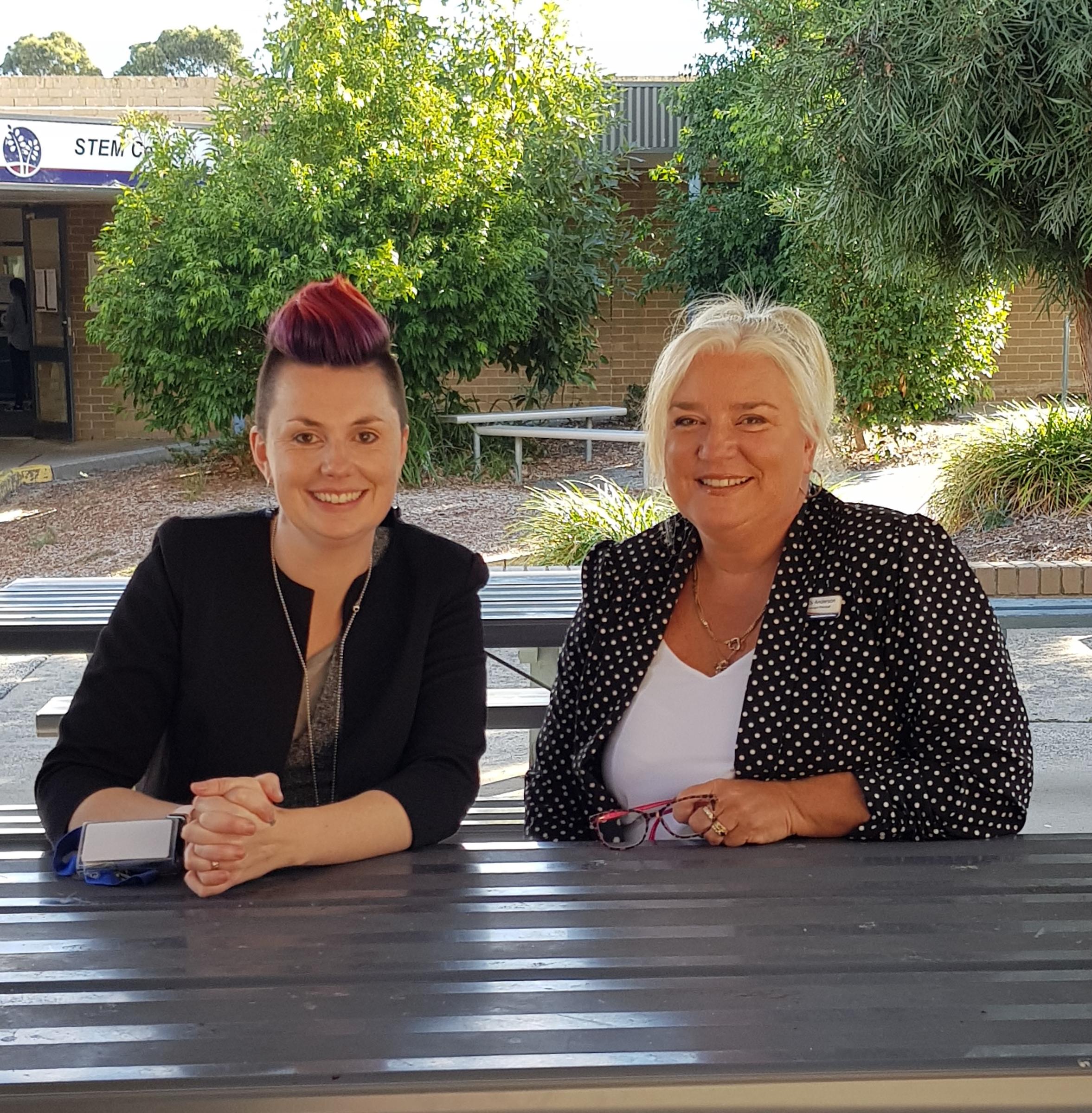Assistant Principal's Page

The test that shall not be named . . .
Did we lose you already?
We said the word TEST.
Why? Why did we need to do that?
Not only did we say test, but we said ‘The test that shall not be named . . . ‘
Even worse!!!
No one wanted to bring it up but we’re going to. We’re bold like that. We had a few tests this week at school and it rhymes with ‘Map-land’ or it is synonymous to a ‘Tired Idea.’ Hahahaha. That one is funny because it embodies a lot of people’s thoughts to the test that shall not be named . . .
A Tired Idea. We get it. It’s controversial. It’s ONE DAY (technically more than one day but shhhh). It depends on how you are feeling on that day. For example, today, If we (Judy and Claire) did the test today, we would soon be sitting in Aaron’s office trying to convince him that we do know a little about education and we are the right people for this job.
In our job, we find ourselves talking and thinking about the Map-land every day. Some mornings we wake up and gasp ‘WHHHHHYYYYY? Why have this test?!’ Other mornings we wake up and think ‘YES!! Let’s do this!’
This article is not going to be filled with quotes from scholar’s passionately defaming or robustly pontificating the test that shall not be named importance. You may already have an opinion, and/or you can read what is out there and you can make up your own mind. We are just going to offer you thoughts from a teacher’s/parent’s perspective.
The data schools receive is extremely useful. It’s our job to go through it and find ways to improve our curriculum and student outcomes. If we didn’t have this standardised test and its data, it would be a huge struggle to pin point areas where our students are excelling or need more support and where the individual can have the opportunity to hone in on a particular skill. We would have to come up with other ways to do it, and in the end, what would be the outcome . . . ummmmm . . . a test? an assessment?
We’ve only got a certain amount of words to play with in this news article here and we’ve taken up a lot of it with humour so as to avoid saying anything too controversial. However, as a parents, we would like to know the specifics of how we can support our children in their education. We look forward to seeing the results of their Tired Idea. Just so we can see an answer to the question ‘What can I do for my children?’
We have all seen athletes and sports people share success stories and heartbreaks. We’ve seen the utter devastation or the amazing elation. I don’t think the athletes were thinking ‘I won, but remember, it was only an indicator of how I was feeling that day!’ or ‘I lost, and all the years and years of training came down to the fact that the race was on my least favourite day.’
In VCE we see our students take away terrific grades or take a hard hit to their ATAR. We don’t have our University’s saying ‘You didn’t make the score we require for you to enter the course, but we think, if you sat the End of Year exam on the Tuesday instead of the Monday you would have killed it. Welcome.’
In job interviews we need to prepare ourselves for possible questions and be creative and persuasive with our answers. Because, guess what? The panel is going to judge us on a few words we wrote on our CV and Selection Criteria but also, they will judge our responses On. The. Day.
All of the above examples are from participants who have prepared for the test, race, game or interview. Map-land is different, our students don’t prepare for this?
Don’t they?
Really?
We’re confused.
Do they not write at school? Do they not learn about subject specific vocabulary in their subjects and learn about specific ways to structure a certain Text Type or attack a difficult mathematical problem? Hmmmm.
It’s life. It’s hard and it challenges us. To learn and improve we must sit out of that comfort zone and feel the emotions that confront us.
We must MAP-LAND.
Let's All Take Time to Stop and Smell the Roses.
With the busy nature of the daily grind and the ever increasing demands that are continually placed upon all of us, it is important that to be effective parents, students and educators, that we don’t forget to put the time into the little things that help shape who we are.
Research suggests that we can support our children to develop into resilient, confident, contributing members of society through nurturing the connections that we have with one another and a key way of achieving this is by making the time to reconnect with children after periods of time apart from each other.
One way of reconnecting is through questioning. I am sure we have all experienced the short dialogue of “how was school today?” with the response of “good” or “ok”. In an attempt to create more sustained conversations, with the aim of furthering our connections, one option could be to try some open ended questions such as, “How” and “Why” questions. These types of questions get children talking because they open the door to more than just one-word answers. As parents and
educators, these questions could form part of our daily routine whether it be at school or at home.
Why not try some of these conversation starters:
Questions for teenagers about themselves
- What are you excited about right now?
- What was your first thought when you woke up today?
- What do you want to accomplish by your next birthday?
- If you could be famous for one thing, what would it be?
- What’s the best thing about your life?
- What’s a small thing that makes you feel happy?
- What’s something you want to do, but you can’t yet?
- What makes you feel loved?
- What will you be doing in 10 years?
- If you could only eat one food for an entire year, what would you choose?
- If you could have one superpower, what would it be?
- What’s the best thing that has ever happened to you and why?
- What’s the worst thing that has ever happened to you and why?
- What are you most proud of and why?
- Which rule do you have to follow that doesn’t make sense?
- If you could pack anything in your lunch tomorrow, what would it be?
- What makes you feel special?
- If you had to choose only three words to describe yourself, what would you say?
- If you were invisible, where would you go and what would you do?
- What do you worry about the most?
- What’s something you’re looking forward to?
- When do you feel happiest?
- What’s the most important thing you’ve learned so far?
- What’s your favourite joke?
- What is one thing you want to learn how to do?
- If you could stay up all night, what would you do?
Questions for teenagers about family and friends
- What’s your favorite thing to do as a family?
- What’s something nice someone said to you lately and how did that make you feel?
- Who understands you the best?
- If you could change one family rule, what would you change?
- What’s your favorite thing to do with your friends?
- If you could switch places with one person for a day, who would it be and why?
- What’s something you did to help someone today?
- What do you get to do at someone else’s house that you wish you could do at ours?
- What advice would you give to a younger sister or brother?
- What’s the smartest thing you heard somebody say today?
- Who made you smile today and why?
- What’s your favourite family tradition? Why?
- What’s the funniest thing somebody did or said today?
- What was the last time someone was mad at you and how did you manage that?
- If we didn’t have to go to school or work on Monday, what would you want to do all day?
- Has someone ever asked you to do something you didn’t want to do?
- What’s the most important thing for a parent to do?
Questions for teenagers about the world
- Twenty years from now, where do you think you’ll live?
- What’s the biggest problem in our world?
- If you could give everybody in the world one piece of advice, what would you say?
- If you could create one law that everybody on Earth had to follow, what would it be?
- If you could learn any language, what would you learn?
- What will the world be like in 10 years? What will be the same? What will be different?
- If you could live in another country for one year, where would you live?
Source: Adapted from Happy you Happy Family
Privacy Awareness Week 2019 12 - 18 May.
What happens to the information I post on social networking sites?
The information you share online may be permanently recorded. Even when you deactivate your account, the information you shared may remain in archived or old versions of websites, or in comments you’ve made on other people’s pages.
You may not have control over who sees or accesses the personal information you share on social media. The results of over-sharing, or having your posts shared without your consent, can be as varied as personal and professional reputational damage and identity theft. You should always think carefully about the information and content you post about yourself.
Read the privacy policies of the social networking sites you use and choose the privacy settings that best suit your needs.
Who is allowed to use the personal information I post on social networking sites?
If the information on your social networking page is publicly available, then anyone can look at it. This means potential employers could look at your page and perhaps base their decisions on what they see there.
Even if you use privacy settings to limit who can see your information, you may not be able to control how people you have permitted to see your information use it. For example, your friends may republish your information to a wider audience than you did.
Source: Office of the Australian Information Commissioner
Judy Anderson and Claire Hanley
Assistant Principals


